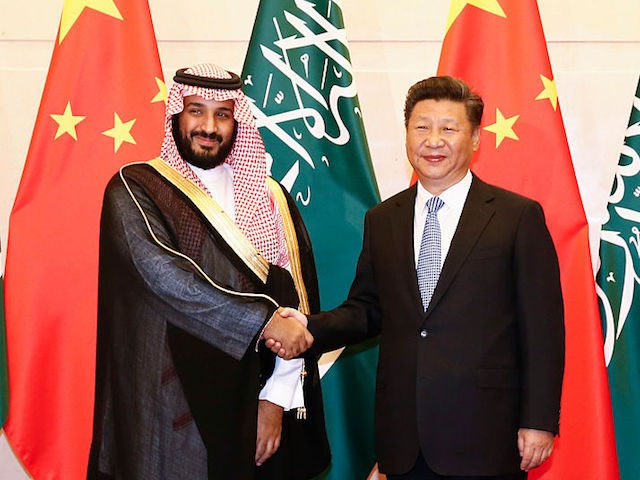Chinese President Xi Jinping offered Saudi Arabia’s King Salman what state media called “unwavering cooperation” in a phone call on Thursday, the first high-level statement out of Beijing since Riyadh arrested a number of influential government officials and businessmen on corruption charges.
In addition to a sweeping corruption crackdown, Saudi Arabia found itself embroiled in a regional crisis as former Lebanese Prime Minister Saad Hariri resigned from his post this month and re-emerged in Saudi Arabia, alleging that Iranian terrorists were plotting to kill him.
The Chinese state outlet Global Times reported that Xi affirmed to Salman that China’s support to Riyadh “will not waver, no matter how the international and regional situation alters.” Salman, in turn, reportedly told Xi that “his country was ready to become an important partner of China in the Gulf region and commit to enhancing their bilateral comprehensive strategic partnership.”
Xi reportedly expressed an interest in “integrating” Saudi Arabia into its One Belt One Road plan to dominate Asian land trade through massive infrastructure investments.
Salman also reportedly congratulated Xi on his elevation to Mao Zedong status at October’s Communist Party of China (CPC) Congress. Xi’s name is now enshrined in the party’s constitution, and “Xi Jinping Thought” the law of the land. “King Salman said he believed the Congress would guide the Chinese people to greater achievements,” the Global Times reported.
While the Global Times dwelled on King Salman’s positive attitude towards Xi’s increasingly ironclad grip on power, the Saudi news agency Al Arabiya noted that Xi had vowed to support Saudi Arabia specifically on efforts to “safeguard national sovereignty and achieve greater development … at a time of regional tensions between Saudi Arabia, Iran, Lebanon, and Yemen.”
Al Arabiya notes that China “has traditionally played little role in Middle East conflicts of diplomacy,” but acknowledged Xi’s clear desire to become a more prominent actor in the region.
China has engaged Saudi Arabia heavily this year. King Salman visited Beijing in March, leaving with $65 billion in trade deals signed, many involving large oil purchases. China is the world’s second-largest oil market and a lucrative partner for Saudi Arabia, still the world’s largest oil exporter.
“For a long time, China and Islamic countries have respected each other and had win-win cooperation, and have created a model of the peaceful coexistence of different cultures,” Xi said at the time, according to Reuters.
China sent sending Vice Premier Zhang Gaoli to the country in August to discuss trade once more, leaving with another nearly $70 billion in trade deals. China is particularly interested in developing Saudi infrastructure, as it is everywhere else, as part of the One Belt One Road plan.

COMMENTS
Please let us know if you're having issues with commenting.